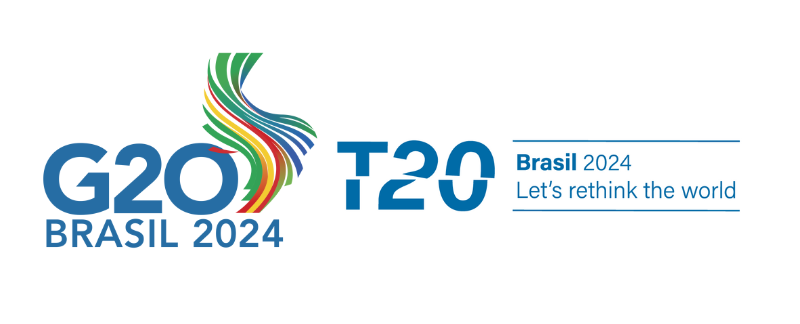Following the 70s economic crisis, the State’s role in providing welfare services has receded, giving primacy to the market. The advancement of digitalization in service delivery builds on this dynamic. A solutionist, silver-bullet approach to bridge gaps in service delivery and improve last-mile access has positioned private entities at critical nodes, particularly within the healthcare sector. In this policy brief, we highlight the pitfalls of a techno-deterministic approach to digitalization including the increased commodification of health services, the shrinking space for civic action, and the dilution of individual and community data rights. The trend towards government-as-platform has deepened the distance between the citizen and the State. These concerns have wider relevance as digital innovation is sought to be exported by first movers and lead firms through the G20 cooperation route to less developed countries (for instance, in the African Union). We argue that the constraints imposed on States to imitate the supposed successes of other countries by importing practices and systems from vastly different contexts results in perpetuating the capability trap. It also masks deeper dysfunction in the lack of institutional capacity. Tied to the global governance discussion and debates about digitalization, colonization, and imperialism, a reorientation of public services platformization is thus vital. Our key recommendations include the need to center democratic discourses in the policymaking process; subject public-private partnerships to strict evaluation and monitoring mechanisms, and enforce a life-cycle approach for data governance that centers data rights.
Reorienting Public Services Platformization In Health Tfo05: Inclusive Digital Transformation
Anita Gurumurthy (IT for Change (India)), Cynthia Picolo (LAPIN (Brazil)), Eshani Vaidya (IT for Change (India)), Raquel Rachid (Lapin (Brazil)), Beatriz Tibirica (Coletivo Digital (Brazil)), Clarissa Franca (AqualtuneLab (Brazil)), Ketaki Nagaraju (IT for Change (India)), Marcelo Fornazin (Fiocruz (Brazil)), Matheus Falcao (Cebes (Canada))
Abstract
Authors
Anita Gurumurthy (IT for Change (India)), Cynthia Picolo (LAPIN (Brazil)), Eshani Vaidya (IT for Change (India)), Raquel Rachid (Lapin (Brazil)), Beatriz Tibirica (Coletivo Digital (Brazil)), Clarissa Franca (AqualtuneLab (Brazil)), Ketaki Nagaraju (IT for Change (India)), Marcelo Fornazin (Fiocruz (Brazil)), Matheus Falcao (Cebes (Canada))
Latest Policy Briefs

This Policy Brief advocates a thorough shift for the G20 from reliance on GDP as an economic yardstick of national performance and conventional measures of corporate profits as a ...

Ensuring food security emerges as a critical global imperative, particularly in the present and future uncertain geopolitical and economic circumstances. The contemporary agri-food systems heavily depend on international trade, ...
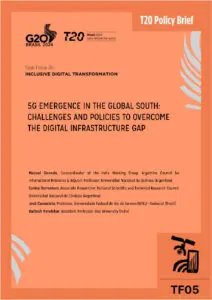
5G Emergence In The Global South: Challenges And Policies To Overcome The Digital Infrastructure Gap
Since 2016 G20 has focused on digital connectivity as an economic prosperity driver and the overcoming of multiple social inequalities. Currently, 5G is playing a prominent role in foreign ...
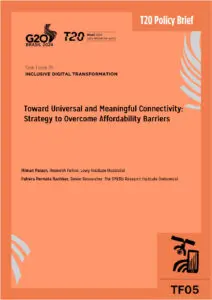
The challenge of digital affordability persists, with approximately 2.6 billion people, one-third of the global population, still lacking connectivity. While smartphones and broadband access are becoming more affordable in ...
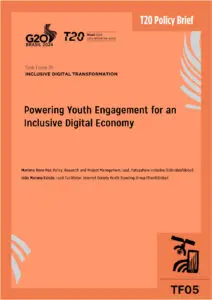
This policy brief advocates for youth meaningful engagement in digital economy policy and leverages youth’s perspectives on how to ensure that new digital technologies advance the Sustainable Development Goals ...
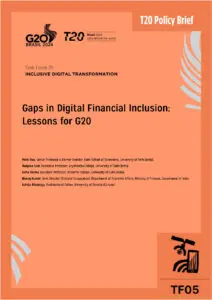
This policy brief aims to construct and analyze indices for access and usage dimensions of digital financial inclusion (DFI) in G20 economies, incorporating demographic characteristics such as gender, age, ...


